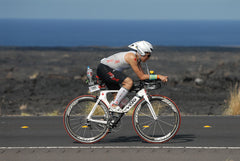Late Season Triathlon Tips From TriSwimCoach
Late Season Racing in North America
By this time, many triathletes are both physically and mentally ready to throw in the towel and begin their offseason especially those who have been racing since the end of March and April. These final races can still be personal bests though with a few key adjustments to your training and race planning.
Temperatures can still creep up to the mid 80s in these late races
 Every year people at Ironman Maryland, Augusta 70.3, Silverman 70.3, and of course the big show itself, Kona, have to go to the ER tent because of dehydration and heat exhaustion even though these races are at the end of September and October. Just because the race is in the fall on the calendar does not mean that the race will be a cool one. If you are planning to do one of these traditionally hot races, be prepared by training in the heat and planning out your race day fueling with extra electrolytes.
Every year people at Ironman Maryland, Augusta 70.3, Silverman 70.3, and of course the big show itself, Kona, have to go to the ER tent because of dehydration and heat exhaustion even though these races are at the end of September and October. Just because the race is in the fall on the calendar does not mean that the race will be a cool one. If you are planning to do one of these traditionally hot races, be prepared by training in the heat and planning out your race day fueling with extra electrolytes.
We particularly like the electrolyte spray from Enduropacks, which they now sell separately from their recovery boxes. Having used this in my own training and racing, I particularly like how it is sugar and preservative free so if the day is a hot one, I will not run the risk of GI distress and is customizable to my high sweat level.
Prepare For Cold And Wet Conditions
While some races are hot death marches, other races can be uncharacteristically cold and wet, for example Ironman Lake Tahoe. If this is the case, then you need to be prepared and make the necessarily adjustments to your race plan. If the forecast calls for rain or a cold front, be sure to bring extra clothing as you are packing and plastic baggies for your clothes to keep them dry. A long sleeve wetsuit might also be required.
Plenty of Sleep, Protein, and Antioxidants

Mentally, the end of the season can be tough. To deal with this psychological fatigue, you may need to extend your taper from a week, which might have been sufficient back in April when you were fresher, to a week and a half or even two depending on the distance of your upcoming race. Try to stick to your training as closely as possible but realize that you may need more sleep, protein, and antioxidants to support recovery. If you do need to change the plan cut the fluff and focus on the intensity and race pace work.
Just because the end of the year is near does not mean you can get complacent and slack off. Be vigilant, focused, and prepared to end the year with a personal best not a DNF.
Train Hard,
Coach Chris and Kev at TriSwimCoach.com
Also in Blog

The Impact Of Dehydration On Performance
Dehydration Results In Lower Blood Pressure And Slows Bodily Processes. Active individuals should be aware of the acute effects of dehydration on performance. With just a 2% loss of water in the body, heat regulation becomes impacted. With a 3% drop in body weight from water loss, muscle cell contraction is impacted. And at 4% loss, there is 5-10% reduction in overall performance that can last up to 4 hours.

How To Survive The Heat and Humidity

Dropping Unnecessary Sugars In Your Sports Drink Is Easy
We need to hydrate. But how can you hydrate and replace electrolytes without the harmful additives like sweeteners and artificial flavoring common in sports drinks that are harsh on your stomach?
